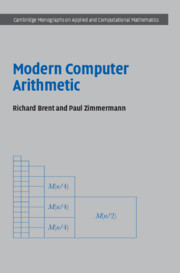5 - Implementations and pointers
Published online by Cambridge University Press: 05 August 2012
Summary
Here we present a non-exhaustive list of software packages that (in most cases) the authors have tried, together with some other useful pointers. Of course, we cannot accept any responsibility for bugs/errors/omissions in any of the software or documentation mentioned here – caveat emptor!
Websites change. If any of the websites mentioned here disappear in the future, you may be able to find the new site using a search engine with appropriate keywords.
Software tools
CLN
CLN (Class Library for Numbers, http://www.ginac.de/CLN/) is a library for efficient computations with all kinds of numbers in arbitrary precision. It was written by Bruno Haible, and is currently maintained by Richard Kreckel. It is written in C++ and distributed under the GNU General Public License (GPL). CLN provides some elementary and special functions, and fast arithmetic on large numbers, in particular it implements Schönhage–Strassen multiplication, and the binary splitting algorithm. CLN can be configured to use GMP low-level MPN routines, which improves its performance.
GNU MP (GMP)
The GNU MP library is the main reference for arbitrary-precision arithmetic. It has been developed since 1991 by Torbjörn Granlund and several other contributors. GNU MP (GMP for short) implements several of the algorithms described in this book. In particular, we recommend reading the “Algorithms” chapter of the GMP reference manual.
- Type
- Chapter
- Information
- Modern Computer Arithmetic , pp. 185 - 190Publisher: Cambridge University PressPrint publication year: 2010

